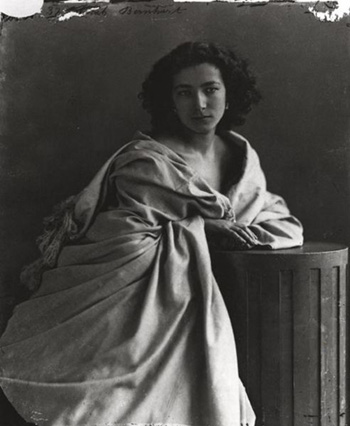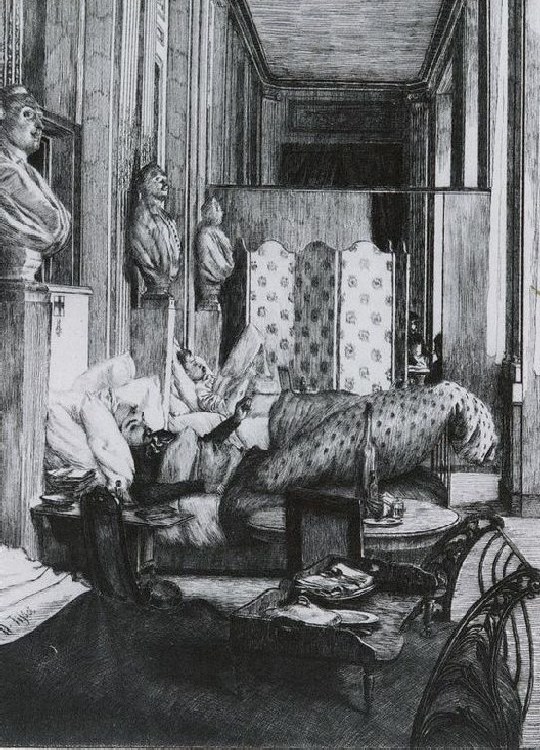Sarah Bernhardt, My Double Life Sarah Berhardt, the most celebrated French actress of the century, devoted a section of her autobiography to her experiencesduring the siege of Paris The Siege of Paris SARAH BERNHARDT'S AMBULANCE AT THE ODÉON THEATRE The defence, however, was being organised, and I decided to use my strength and intelligence in tending the wounded. The question was, where
could we install an ambulance? The Odéon Theatre had closed its doors, but I moved heaven and earth to get permission to organise an ambulance in that theatre, and, thanks to Emile de Girardin and Duquesnel, my wish was gratified. I went to the War Office and made my declaration and my request, and my offers were accepted for a military ambulance. The next difficulty was that I wanted food. . . [Bernhardt goes to the Tuilleries Palace to try to get food for her ambulance station.] The Palace was no longer the same. The very atmosphere had changed. The
faint perfume which elegant women leave in the air as they pass was no
longer there. A vague odour of tobacco, of greasy clothes, of dirty
hair, made the atmosphere seem heavy. Ah, the beautiful French Empress!
I could see her again in her blue dress embroidered with silver,
calling to her aid Cinderella's good fairy to help her on again with
her little slipper. The delightful young Prince Imperial, too! I could
see him helping me to arrange the pots of verbena and marguerites, and
holding in his arms, which were not strong enough for it, a huge pot of
rhododendrons, behind which his handsome face completely disappeared.
Then, too, I could see the Emperor Napoleon III. with his half-closed
eyes, clapping his hands at the rehearsal of the curtseys intended for
him. And the fair Empress, dressed in strange clothes, had rushed away in the carriage of her American dentist, for it was not even a Frenchman, but a foreigner, who had had the courage to protect the unfortunate woman. And the gentle Utopian Emperor had tried in vain to be killed on the battle-field. Two horses had been killed under him, and he had not received so much as a scratch. And after this he had given up his sword. And we at home had all wept with anger, shame, and grief at this giving up of the sword. And yet what courage it must have required for so brave a man to carry out such an act. He had wanted to save a hundred thousand men, to spare a hundred thousand lives, and to reassure a hundred thousand mothers. Our poor, beloved Emperor! History will some day do him justice, for he was good, humane, and confiding. Alas, alas! he was too confiding! . . .
I cannot recall those terrible days without the deepest emotion. It was nolonger the country in danger that kept my nerves strung up, but the sufferings of all her children. There were all those who were away fighting, those who were brought in to us wounded or dying; the noble women of the people, who stood for hours and hours in the queue to get the necessary dole of bread, meat, and milk for their poor little ones at home. Ah, those poor women! I could see them from the theatre windows, pressing up close to each other, blue with cold, and stamping their feet on the ground to keep them from freezing—for that winter was the most cruel one we had had for twenty years. Frequently one of these poor, silent heroines was brought in to me, either in a swoon from fatigue or struck down suddenly with congestion caused by cold. On December 20 three of these unfortunate women were brought into the ambulance. One of them had her feet frozen, and she lost the big toe of her right foot. The second was an enormously stout woman, who was suckling her child, and her poor breasts were harder than wood. She simply howled with pain. The youngest of the three was a girl of sixteen to eighteen years of age. She died of cold, on the trestle on which I had had her placed to send her home. On December 24, there were fifteen degrees of cold. I often sent Guillaume, our attendant, out with a little brandy to warm the poor women. Oh! the suffering they must have endured—those heart-broken mothers, those sisters and fiancées—in their terrible dread. How excusable their rebellion seems during the Commune, and even their bloodthirsty madness! . . . My ambulance was full. I had sixty beds, and was obliged to improvise ten more. The soldiers were installed in the green-room and in the general foyer, and the officers in a room which had been formerly the refreshment-room of the theatre. One day a young Breton, named Marie Le
Gallec, was brought in. He had been struck by a bullet in the chest and
another in the wrist. Dr. Duchesne bound up his chest firmly, and
attended to his wrist. He then said to me very simply: I bent over his bed, and said to him: "Tell me what would give you pleasure, Marie Le Gallec." "Soup," he answered promptly, in the most comic way. Madame Guérard hurried away to the
kitchen, and soon returned with a bowl of broth and pieces of toast. I
placed the bowl on the little four-legged wooden shelf, which was so
convenient for the meals of our poor sufferers. The wounded man looked
up at me and said, "Barra." I did not understand, and he repeated,
"Barra." His poor chest caused him to hiss out the word, and he made
the greatest efforts to repeat his emphatic request. I sent immediately to the Marine Office,
thinking that there would surely be some Breton seamen there, and I
explained my difficulty and my ignorance of the Breton dialect. I was informed that the word "barra"
meant bread. I hurried at once to Le Gallec with a large piece of
bread. His face lighted up, and taking it from me with his sound hand,
he broke it up with his teeth and let the pieces fall in the bowl. He
then plunged his spoon into the middle of the broth, and filled it up
with bread until the spoon could stand upright in it. When it stood up
without shaking about, the young soldier smiled. He was just preparing
to eat this horrible concoction when the young priest from St. Sulpice
who had my ambulance in charge arrived. I had sent for him on hearing
the doctor's sad verdict. He laid his hand gently on the young man's
shoulder, thus stopping the movement of his arm. The poor fellow looked
up at the priest, who showed him the holy cup. "Oh," he said simply, and then, placing his coarse handkerchief over the steaming soup, he put his hands together. We had arranged the two screens which we used for isolating the dead or dying around his bed. He was left alone with the priest whilst I went on my rounds to calm those who were chaffing, or help the believers raise themselves for prayer. The young priest soon pushed aside the partition, and I then saw Marie Le Gallec, with a beaming face, eating his abominable bread sop. He soon fell asleep but awoke before long and asked for something to drink, and then died in a slight fit of choking. Fortunately I did not lose many men out of the three hundred who came into my ambulance, for the death of the unfortunate ones completely upset me.
|

The Gallery of the Comedie-Francaise during the Siege of Paris 1870


